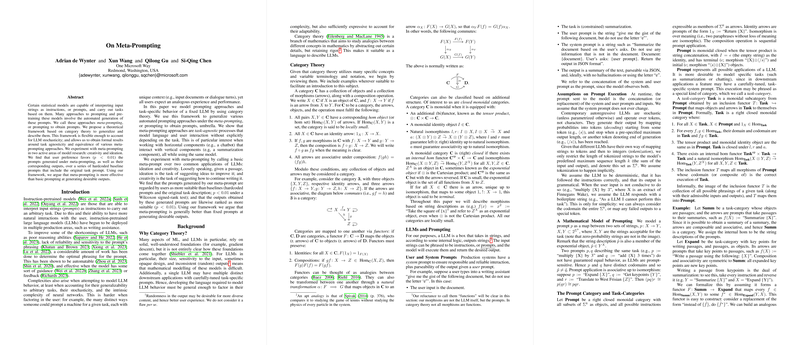On Meta-Prompting: A Formal Framework and Its Implications
The paper "On Meta-Prompting" by Adrian de Wynter et al. presents a theoretical framework for understanding and generalizing prompting techniques in LLMs through a novel concept called meta-prompting. The authors propose the use of category theory as the mathematical foundation for this framework, allowing them to encapsulate various aspects of LLM behavior, including prompt sensitivity, task generalization, and user interaction. This framework is particularly notable for its flexibility in accounting for the stochastic nature of LLMs, thus enabling formal results concerning task agnosticity and the equivalence of meta-prompting strategies.
Theoretical Framework
The authors introduce category theory as an appropriate mathematical tool for describing LLMs and their prompting techniques. Categories, functors, and natural transformations form the backbone of this framework, providing a formal structure within which LLMs can be modeled. In this context, prompts are represented as morphisms between objects (sets of strings), and a category of all possible LLM prompts, denoted as Prompt, is defined. Each specific language task, such as summarization or creativity, is modeled as a subcategory, termed a task-category, derived from Prompt through an inclusion functor.
One of the central contributions of the paper is the notion of meta-prompting, where the internal hom functor in a task-category facilitates the dynamic generation of prompts based on user-provided context. This results in a meta-prompt morphism, which acts as a higher-order prompt capable of generating suitable task-specific prompts autonomously. The theoretical framework asserts that such meta-prompt morphisms are inherently task-agnostic, reinforcing their utility across varied tasks without necessitating task-specific fine-tuning.
Experimental Validation
The authors validate their theoretical claims by experimenting with meta-prompting in two active LLM application domains: ideation and creativity. Using GPT-4, they generate prompts through their proposed meta-prompting method and compare them against baseline hardcoded prompts. User preference tests reveal a significant favorability (p < 0.01) towards the meta-generated prompts and the corresponding LLM outputs, as opposed to the baseline.
The experimental results underscore the practical implications of meta-prompting. The meta-generated prompts not only lead to higher user satisfaction but also demonstrate the potential for improved output quality, hinting at the possibility that adaptive, context-aware prompting strategies could outperform static, predefined prompts in eliciting desirable LLM performances.
Implications and Future Directions
The paper suggests profound theoretical and practical implications. Theoretically, the use of category theory provides a robust structure to articulate LLM behaviors, paving the way for more rigorous analysis of LLM capabilities and limitations. Practically, the success of meta-prompting strategies could lead to more efficient, adaptive LLM deployments, where user interactions become naturally more intuitive, elevating LLM capabilities in complex real-world scenarios.
Future research could explore broader applications of meta-prompting across diverse tasks and models, extending the framework to incorporate more sophisticated LLM operations like complex reasoning or fact-checking. Additionally, examining the integration of meta-prompting with other automated prompt optimization techniques may yield synergistic effects, further refining LLM interaction quality and reliability.
In conclusion, "On Meta-Prompting" lays a foundational framework that may significantly impact how researchers and practitioners utilize LLMs, by placing a formal, adaptable mechanism at the heart of prompt design and execution. By establishing a generalizable and scalable approach to prompting, the framework provides a pathway for more precise control and enhancement of LLM-based systems in a variety of application domains.
